If the Touchscreen has suddenly stopped working on your computer, take a good look at the screen of your computer and make sure that it has not suffered any kind of physical abuse or damage.
Next, try using the Keyboard, Mouse or Trackpad, to make sure that your computer is working. If the Keyboard or Mouse is not responding, it is possible that your computer is stuck.
This can be easily fixed by shutting down the computer by pressing the Power button. After the computer is completely powered off, wait for about 60 seconds and restart the computer.
When the computer restarts, you may find the Touchscreen back to its normal working condition.
Touchscreen Not Working in Windows 11/10
If the Touchscreen is not working after the restart and it has not suffered from any kind of physical damage, you should be able to fix the problem using the following steps.
1. Disable/Enable Human Interface Devices
Disabling and Enabling the Touch Screen Driver is known to fix the problem.
1. Right-click on the Start button and click on Device Manager.
2. On the Device Manager screen, expand Human Interface Devices entry > right-click on HID-compliant touchscreen and click on Disable Device.
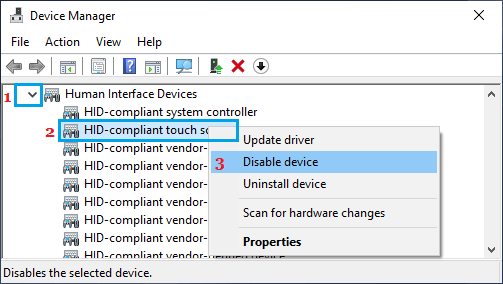
Note: If you find multiple HID-compliant touchscreen entries, repeat the above step and disable all of them.
3. After 30 seconds, right-click on HID-Compliant touchscreen and select Enable Device option.
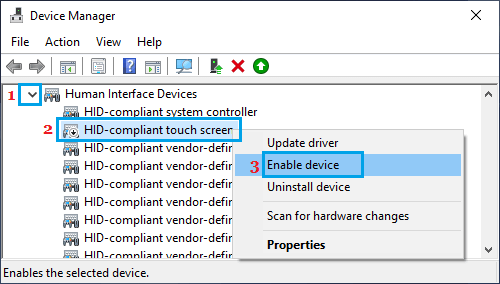
Note: Repeat the above step for all HID-compliant touchscreen entries (if any).
4. Restart the computer and check if the Touchscreen is now working properly on your computer.
2. Check For Updates
It is possible that the problem is due to your computer not being up-to-date with the latest latest software updates.
1. Open Settings > click on Update and Security.
2. On the next screen, click on Windows Update in the left pane. In the right-pane, click on Check for updates button.
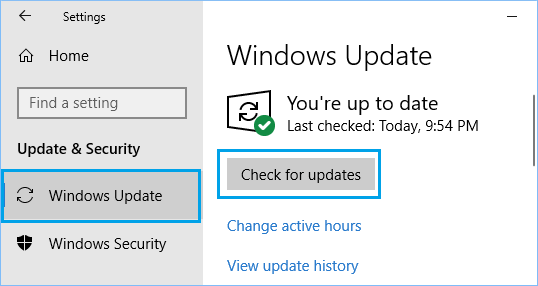
3. Download and Install Updates (if they are available).
3. Configure Touchscreen
Follow the steps below to configure the screen of your Windows Laptop as a Touchscreen.
1. Type Calibrate in the Search bar and click on Calibrate the screen for pen and touch input option in the search results.
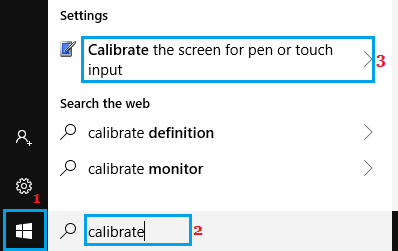
2. On the pop-up that appears, select the Display tab and click on the Setup button.
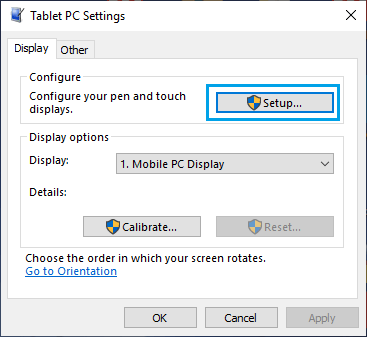
3. On the next pop-up, click on Touch Input option.
4. Follow the on-screen prompts to identify the screen of your computer as Touchscreen.
After completing these steps, check to see if the Touchscreen is now working on your computer.
4. Adjust Power Management Settings for Touchscreen
The problem of Touchscreen not working on your computer might be related to the power saving settings on your computer.
1. Right-click on the Start button and click on Device Manager.
2. On Device Manager screen, expand Human Interface Devices entry > Right-click on HID-Compliant touchscreen and click on Properties.
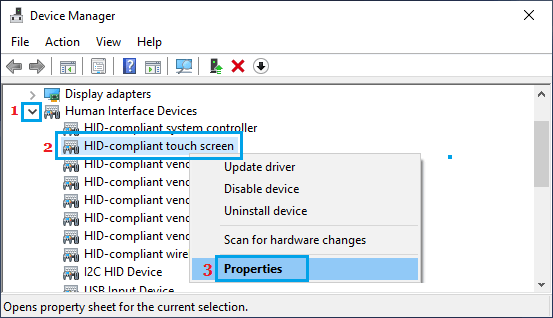
3. On the next screen, click on the Power Management tab and uncheck Allow the computer to turn off this device to save power option.
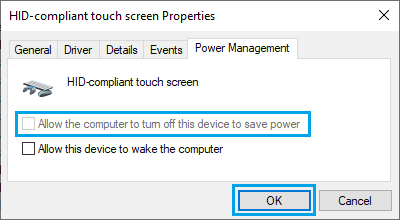
4. Click on OK to save this setting on your computer.
Restart the computer and see if the Touchscreen is now working properly.
5. Perform System Restore
This fix is applicable, if your computer was setup to automatically create System Restore points or if you had manually created a System Restore point on your computer, prior to start of this problem.
If this is the case, you should be able the Restore the computer back to its previous working status by performing a System Restore.
You can find the steps to Restore Windows computer using a System Restore point in this guide: How to System Restore Windows 11/10 computer.
6. Reset the Computer
If a System Restore point is not available on your computer, the only remaining option is to Reset the computer using steps as provided in this guide: How to Factory Reset Windows Computer.